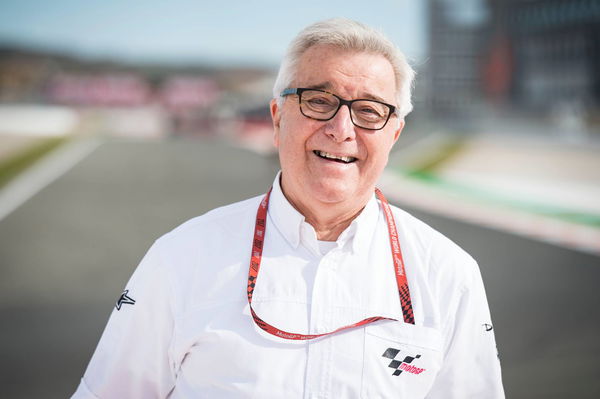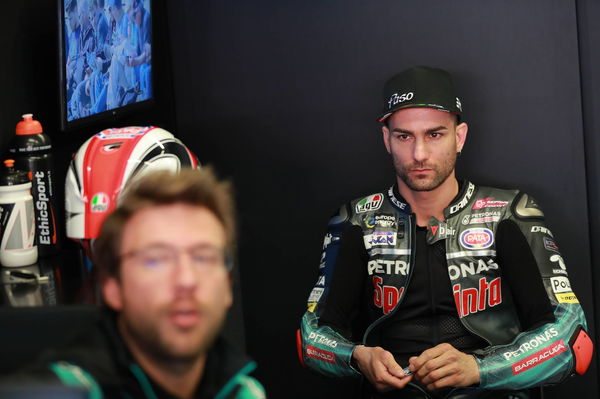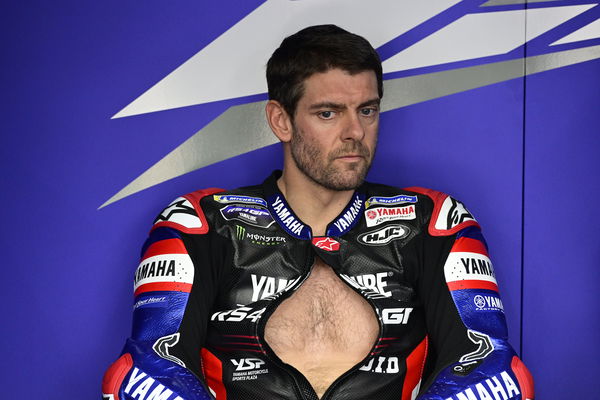Exclusive: Nick Harris Interview
Former MotoGP commentator Nick Harris talks all things Grand Prix racing, who could be considered the greatest of all time and which is the best era of racing.

Nick Harris will be remembered by many as the voice of MotoGP.
After a career spent in MotoGP as a journalist and commentator, Harris stepped down from commentary duty at the end of 2017.
Still involved with MotoGP along with his BBC radio work covering Oxford United, the British broadcaster has written Never Say Never: The Inside Story of the Motorcycle World Championships, a part-memoir and part-chronological history on 70 years of Motorcycle Grand Prix racing.
Crash.net:
How long has the idea for a book been in your mind and was it something you’ve always wanted to put together?
Nick Harris:
When my career commentating for Dorna came to an end I thought it was the time to do it. Originally it was going to be a Nick Harris biography which would include more than motorcycle racing, as I do lots of other things, but that didn’t excite the publishers too much! But when I mentioned it was the 70th anniversary of Grand Prix racing it tied in perfectly. It has been the ideal way to do it.
Crash.net:
It has been over a year away from MotoGP so has it given you a good amount of time to reflect?
Nick Harris:
Very much so, it brought back an awful lot of memories and after 38 years it was difficult not to be out there for the races. It was absolutely perfect for me as I did feel a bit raw about things and then to be able to do this it meant I could fully occupy my time for six months morning, noon and night. I brought back so many great memories, so many sad memories and so many friends. It was a cleansing effort.
Crash.net:
Was it a cathartic experience at times?
Nick Harris:
Oh yes, as the very nature of the sport, from when I started to now, means it will always be a dangerous sport. The safety in the sport is one of the biggest changes I’ve seen since I’ve been involved but it will always be dangerous. There have been some very sad moments with riders who get killed. I hope the book shows that I was taught from early on that when that happens it is your duty as a journalist and as a friend is to do a really professional job because that is the best way to remember the person who has gone and to honour their memory. It was something that was taught to me very early on by Colin Fenton when my friend was killed at Cadwell Park in the late 1970s. That is the way it was done and something I’ve tried to follow ever since.
Crash.net:
Was there a particular moment of change in MotoGP that stood out?
Nick Harris:
I think there were, on different fronts, and the arrival of Kenny Roberts and the announcement of the World Series – that never actually took place – but it was a terrific shock to the authorities and to the people who ran the sport. It showed the rides were prepared to do something about safety, money and the way they were treated. That was a key moment.
At the time when Dorna took over in the 1980s I don’t think anybody, not even themselves, knew the impact they were going to have on the sport.
There was a race three years ago in Australia when there was 50-odd overtakes in one race and more overtakes than in an entire season of other world championship sport, particularly in four wheels. We started to realise the sport had come on enormously over those 70 years.
Crash.net:
Talking of the current era in MotoGP, you are probably one of the people best in place to answer the question on is it the best era?
Nick Harris:
I think you always look back with rose-tinted spectacles and those early days that I wasn’t involved with but I remember following on the old road circuits with the likes of Geoff Duke and British machinery in the post-war era it was an incredible time. Then the 500cc two-strokes with the likes of Kenny Roberts and Barry Sheene and then the Raineys, the Lawsons, the Schwantzs and the Spencers.
But I don’t think there is any doubt for so many reasons that this is the absolute pinnacle at the moment. Full grids, full factory involvement, different riders winning races every single week and very close racing. The safety has improved probably as good as it ever can be and massive crowds, the average crowd last year over three days at a Grand Prix was 151,000. The sport is in a very good place at the moment. At Jerez [2019 Spanish MotoGP] Marquez was the oldest guy in the front row and on the podium so there is enormous young talent coming through, so the future is very bright.
Crash.net:
Speaking of Marquez, you talk about legends in the sport, is he the next legend in the making?
Nick Harris:
I think so, I wouldn’t even say in the making, I think he has got one foot firmly in the door. Like all sports, it is difficult to compare over the eras as things are so different. Could Valentino Rossi ride three Grands Prix in a day like Mike Hailwood did or could be ride at the TT? Could Mike Hailwood compete in a modern MotoGP race? We will never know. Marquez is right up there with the very best. Things he does on a motorcycle is something we’ve never seen in those 70 years.
I’m also sure the likes of Quartararo, Morbidelli, Mir will be doing the same. Hopefully they can produce something even different. But to watch Marquez ride a motorcycle means you are never going to be bored!
Crash.net:
Who else stands out for you in history?
Follow Page 2 for the second part of the Nick Harris interview...











